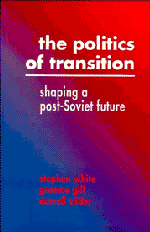Book contents
- Frontmatter
- Contents
- Preface
- 1 Beyond Marxism
- 2 Reforming the electoral system
- 3 Structures of government
- 4 The Presidency and central government
- 5 From union to independence
- 6 Patterns of republic and local politics
- 7 The withering away of the party
- 8 The emergence of competitive politics
- 9 The politics of economic interests
- 10 Public opinion and the political process
- 11 Letters and political communication
- 12 The Soviet transition and ‘democracy from above’
- Notes
- Index
11 - Letters and political communication
Published online by Cambridge University Press: 27 August 2009
- Frontmatter
- Contents
- Preface
- 1 Beyond Marxism
- 2 Reforming the electoral system
- 3 Structures of government
- 4 The Presidency and central government
- 5 From union to independence
- 6 Patterns of republic and local politics
- 7 The withering away of the party
- 8 The emergence of competitive politics
- 9 The politics of economic interests
- 10 Public opinion and the political process
- 11 Letters and political communication
- 12 The Soviet transition and ‘democracy from above’
- Notes
- Index
Summary
Gorbachev made frequent reference to opinion polls during his period of office, particularly during the last months of his Presidency. Discussing the attempted coup with newspaper editors in September 1991, for instance, he noted that 40 per cent of the public at large – according to the polls – had supported it. Speaking to Literaturnaia gazeta on the eve of his resignation, Gorbachev insisted that there was a popular desire to preserve some form of union: the ‘latest opinion polls’ showed that more people were in favour of the union than during the March 1991 referendum, when the principle of federation had been supported by a 76 per cent majority. And yet throughout the Gorbachev years, and before them, there was another way in which leadership and society were connected, and through which public opinion could express itself: letters, above all to the press. Letters were certainly unrepresentative of the wider society: for a start, they over-represented pensioners, the better educated and urban areas. Letters, at the same time, reached party and government offices, as well as the press, in enormous numbers. How, pollsters were asked, could their samples of a thousand or two compare with the millions of communications that reached decisionmakers more directly? Letters, equally, allowed members of the public to express themselves in their own words, without the mediation of interviewers: and it was this direct expression of opinion in which party and state officials were most interested throughout the Gorbachev period, rather than statistical summaries.
- Type
- Chapter
- Information
- The Politics of TransitionShaping a Post-Soviet Future, pp. 193 - 211Publisher: Cambridge University PressPrint publication year: 1993



